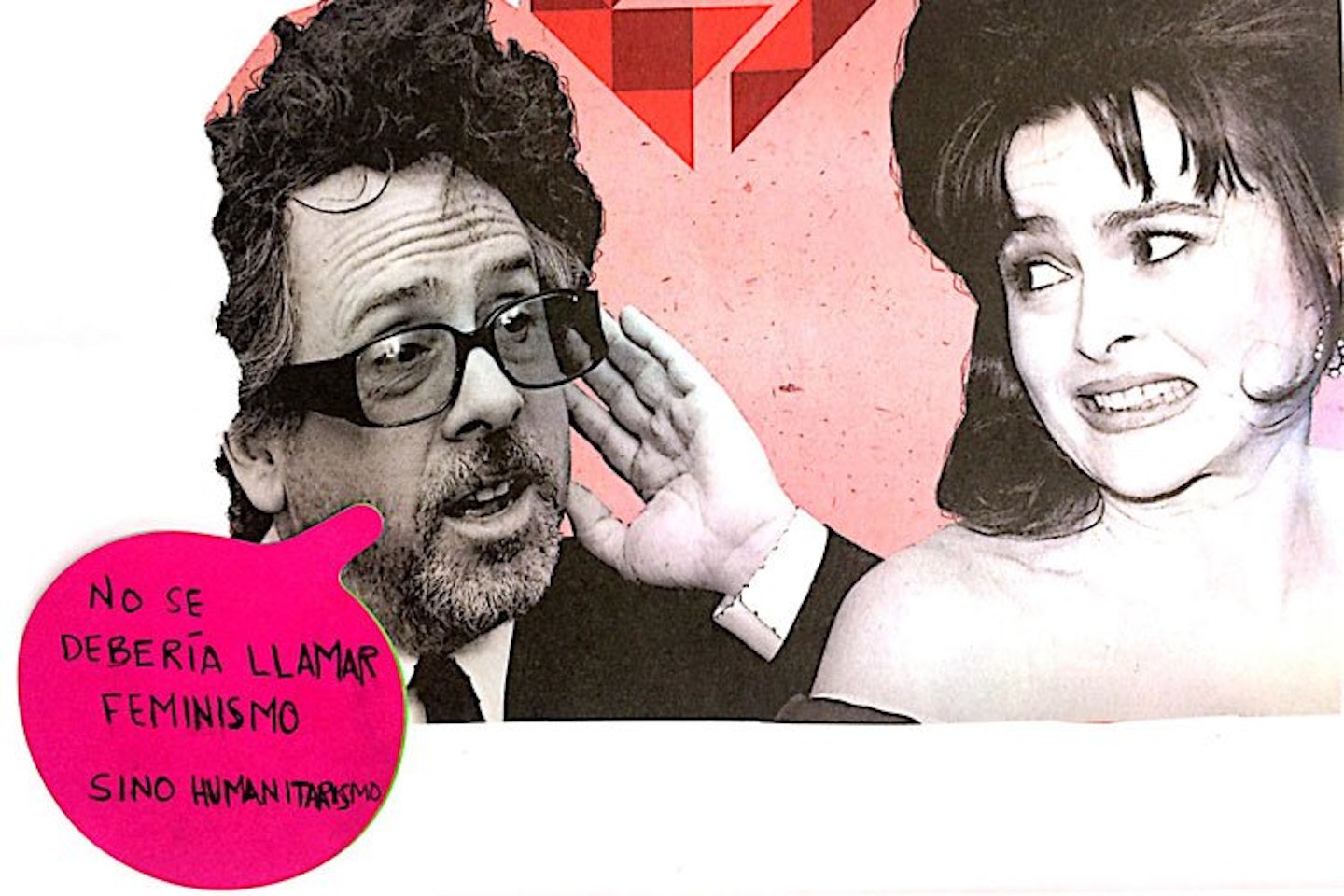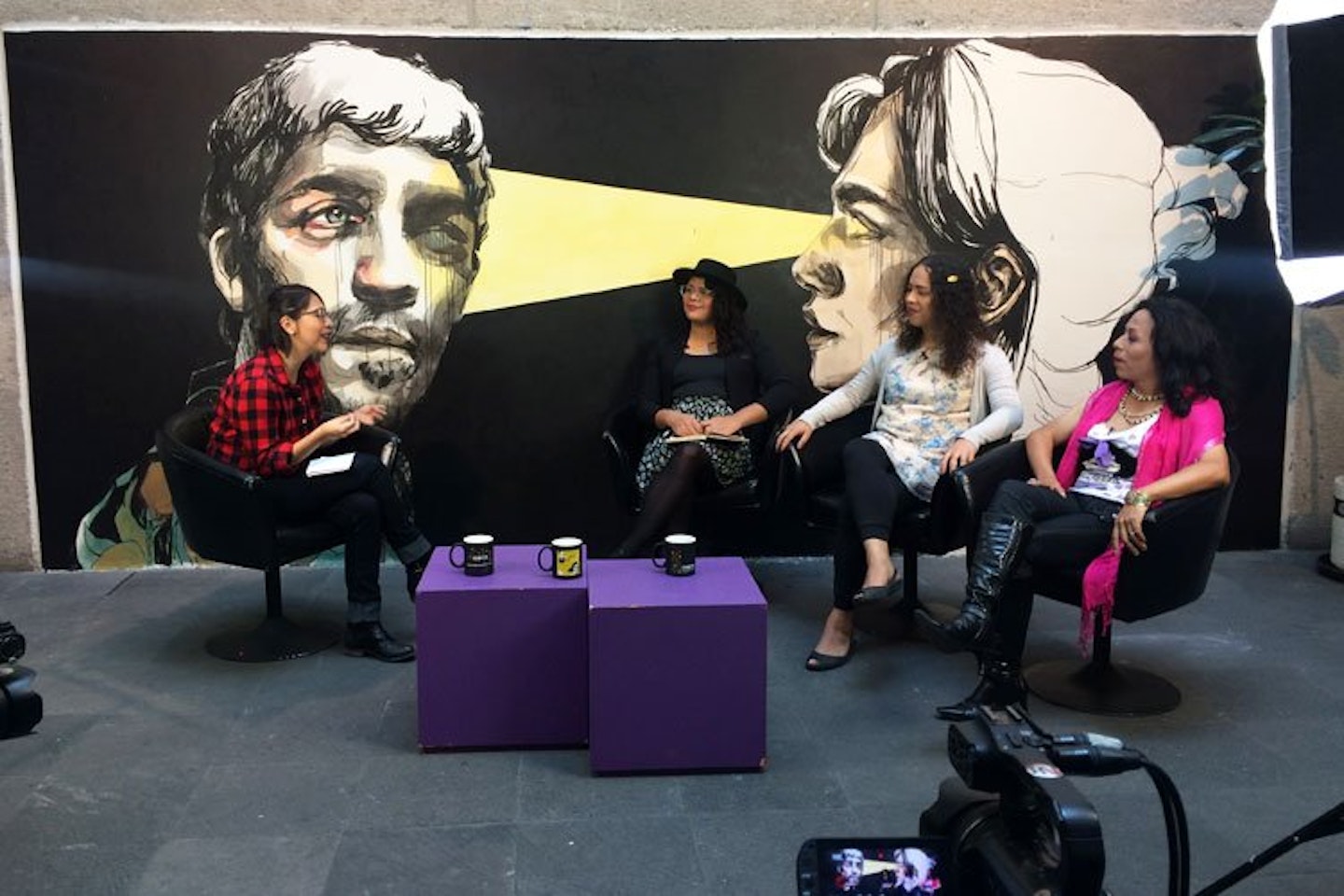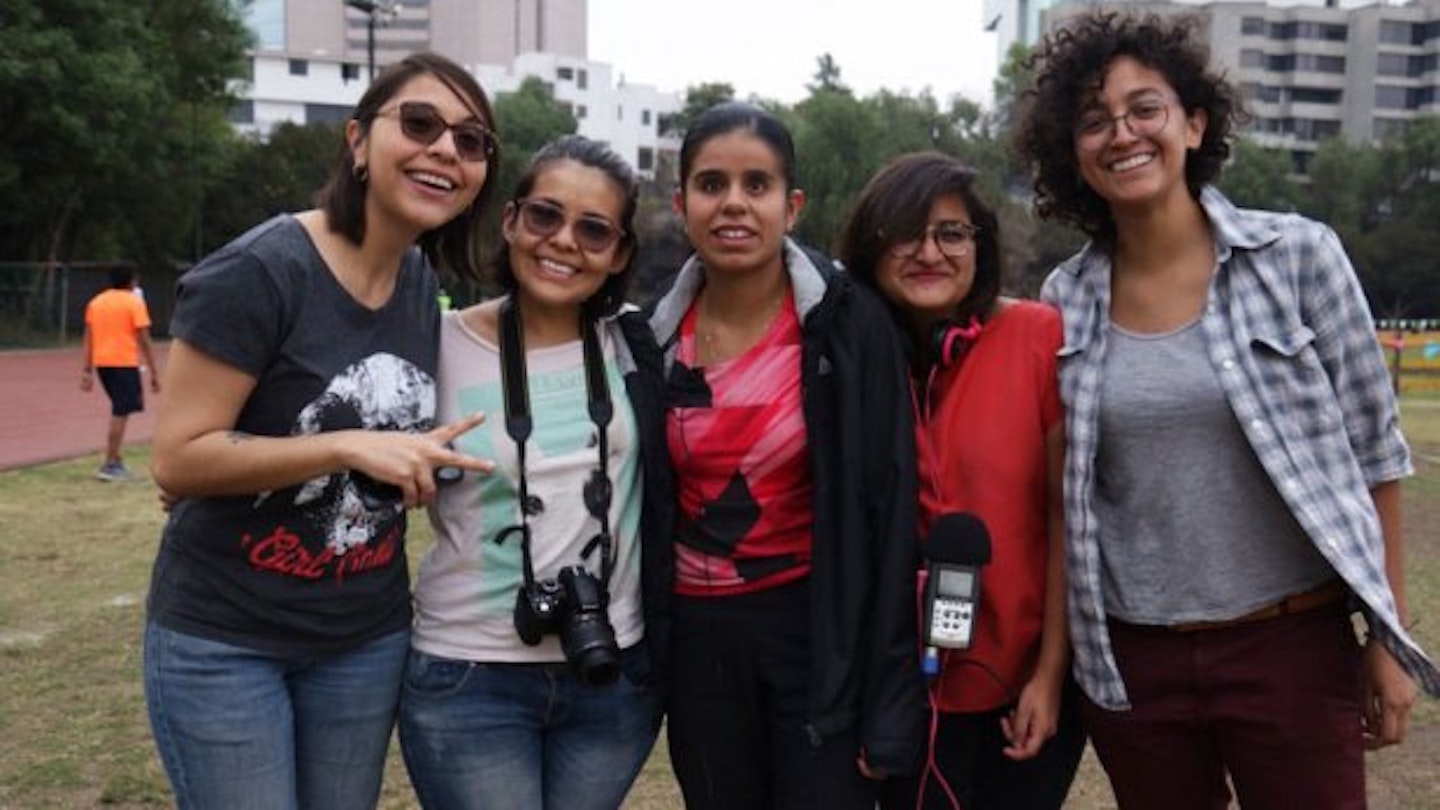‘We are living in a country of death.’ Lulú Barrera is talking about her homeland, Mexico. It’s thought that six women are killed by men every day there; the UN calls it a pandemic. Women deal with sexual harassment all the time – they’re targeted on buses and attacked in the streets.
Abuse, both online and IRL, is rampant. It’s a seriously tough place to fight for women’s rights. But that’s exactly what Lulú is doing. She’s part of an all-woman collective of cyber activists called Luchadoras, based in Mexico City. They spread comedy gifs and girl-power graphics. They stage mass edits of Wikipedia pages to make sure female figures get the credit they deserve.

They’re basically creating an army of women who have had enough of trolls and violence and are taking matters into their own hands. This band of women warriors are taking on the patriarchy – one meme at a time. ‘It’s a way to encourage women to take technology into their own hands, to occupy the digital space, but with fun, with humour,’ says Lulú.
Luchadoras also have an online talk-show that explores topics like transgender rights, cuts to health services, and HIV. They cover the issues the mainstream media won’t.
‘With all the corruption, the femicide, the lack of women in authority – the outlook is really adverse,’Lulú tells me. ‘[We want to tell] stories that can bring you hope again. There’s a way through [this] and it’s not going to come tomorrow or in the future, it’s already happening now. And women are a big part of this.’
The name Luchadoras means ‘female fighters’. It’s a reference to Mexican wrestling, Lucha Libre – those Spandexed guys who romp around in kitschy masks and colourful capes. But the collective also wants to cast women as fighters, as resilient. ‘That’s pretty much the way we want to see women, as luchadoras,’ says Lulú. ‘Because the context can be really adverse but you’re working to make it better.’
Part of this means tackling victim-blaming culture – just this week women expressed their outrage online after the Mexican Office of the Public Prosector tweeted that a student’s lifestyle was to blame for her murder. Lesby Berlin Osorio was strangled at a university campus – and the prosecutor’s tweets targeted her alleged drinking, skipping classes at uni and the fact that she lived with her boyfriend.
‘What we’ve seen is that when the media do get interested in “women’s topics”, it’s from a victimhood perspective,’ Lulú says. ‘Like stressing violence, how you suffer – instead of stressing strength, force or dignity.’
Luchadoras are currently working on an interview with Daniela Velasco, an athlete who competed in the Rio Paralympics last year. ‘We want to tell her story. If we want to break stereotypes, it’s also about the visual language we use. So we portrayed her training, with close-ups on her hands and legs – so it doesn’t let you know she has a disability. And there comes a point in the story where you realise: she can’t see. Then you see how she trains with [a guide].’
Luchadoras wants to give girls alternative role models. Because at the minute all they have are the walking clichés in Mexican telenovelas (soap operas) – obsessed with finding a man and having babies.
‘There’s a very long tradition of soap operas in Mexico,’ says Lulú. ‘They are targeted at women and the main characters reinforce a series of stereotypes, like where the ultimate goal of women’s lives is basically marriage with a rich guy. There was also a show where female figures just discussed their worries about beauty, health and family. We didn’t feel represented at all.’

‘So we wanted to highlight other types of womanhood and say, “these are possible”.’ What we say is that those kinds of references shape women’s beliefs, expectations and what you imagine for your own life. So, we want to broaden and diversify those role models – and also make visible the work that women are doing in the political, economic and social [spheres].”
One way they do that is by running marathon edits of Wiki pages, where huge groups of women upload and rewrite biographies of famous female figures. It’s about making sure women aren’t written out of history (only about 16% of Wiki biographies in Spanish are about women) as well as claiming space online (just 1 in 10 Wiki editors is female).
One of these edited bios was of Julieta Campos, a Cuban writer who lived in Mexico. ‘When we read her biography it began describing her in relation to her husband and his accomplishments,’says Lulú. ‘At one point it even started to talk about the husband’s [career] trajectory. So we edited the entry to place her own work first, and her marriage secondary.’
Lulú believes there have been some victories for women’s rights – but it’s complicated. In April last year, thousands of women took to the streets of Mexican cities to demand an end to gendered violence. They marched under banners reading ‘we want to stay alive’. This massive protest was a wake-up call, says Lulú. People who had previously thought of feminism as a dirty word became interested.
But on the other hand, when Luchadoras interviewed activists involved in the protest, ‘they told us they felt like their oppression was worse after the protest because it [feminism] gained so much visibility. Social networks play a big role there. Because women are becoming more visible, they’re receiving a lot of aggression online.’
‘Every time we speak about freedom of choice or abortion, for example, we immediately receive death threats.’

Depressingly, Lulú thinks online trolling has gotten worse since Luchadoras launched in 2012. That’s partly down to this backlash where men feel threatened by women claiming their rights.
But she also says ‘the digital space has some frontiers [restrictions] we have to live with. Anonymity on one side is seen as a digital right. In a country where exposing your identity, for example your sexual orientation [can put you at risk], you need anonymity to search freely for information or express your opinions. But [anonymity] also allows networks of trolls to attack.’
So what’s the way forward? ‘Keep insisting, keep telling stories. Keep telling women: you can make it.’
‘And also encouraging this networking to happen in real life,” she adds. When we started we were mainly online. But then we realised we didn’t have direct contact with our community face to face, beyond the digital space. And those [IRL] networks are the ones you need whenever you face risk and recrimination. When you face attacks, solidarity networks make you feel you’re not alone.’
Luchadoras also aren’t fans of clicktivism – where you basically just sign an online petition, share it, then forget all about it. ‘The politics of the like and the share are really shaping everything,’ Lulú says.‘The positive thing is it can go viral and reach audiences you might never imagine. But [on the other hand] you get a small dose of info and pass it on, you don’t really engage with the topic in-depth. And we don’t just want people to know about something, but to get engaged – to take action.’
And taking action doesn’t have to be this big epic thing. ‘We see every fight as a revolution,’ Lulú explains. ‘We always say, there’s no bigger fight than another. You don’t have to be like a superhero over there doing extraordinary things. Every day we can do things for change.’
‘For example [taking on] street harassers, or if your family isn’t comfortable with you fighting for human rights, of if your father is not comfortable with you going to school because you’re a woman. Those are battles that you fight every day. So we say: Luchadoras fight everyday revolutions.’
Like this? Then you might also be interested in:
Follow Clare on Twitter @Clare_Wiley
This article originally appeared on The Debrief.
